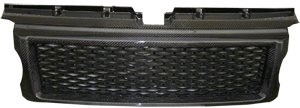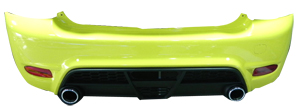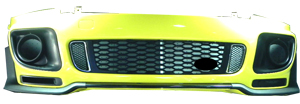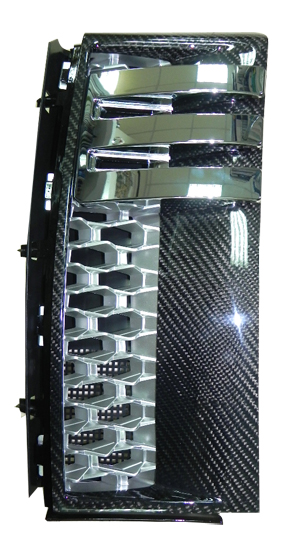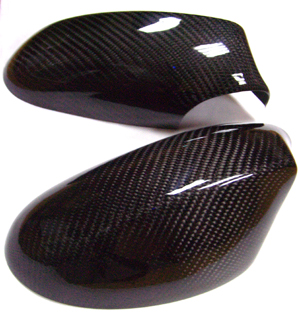Industry Expert Sheds Light on Slower Tuning-Parts Market
Makers from Taiwan, HK and China replace Germans and Japanese at global shows
2011/09/08 | By Quincy Liang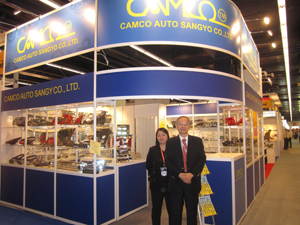
Such trend has sapped the number of tuning-product exhibitors at major international auto parts and accessory shows--Automechanika Frankfurt in Germany, Specialty Equipment Market Association (SEMA) Show in the U.S., Taipei Int'l Auto Parts & Accessories Show (Taipei AMPA) in Taiwan.
Visitors to such shows would remember the "Tuning" sections to be once dominated by hundreds of international players mainly from industrially advanced nations as Japan, Italy, and Germany, but have since been replaced by lower-cost competitors from Taiwan, Hong Kong, and China.
1st Half Conditions
Bruce Liu, chairman of Camco Auto Sangyo Co., a Taiwanese trading company focused on high-end performance-tuning auto parts and accessories for over 15 years, says that players in the game have to be more careful and adopt right strategies to better survive in a lull, while waiting for another crest in demand.
In the first half and generally speaking, Liu points out, his company's sales in Europe, the center of the debt crisis, were partly affected due to sapped consumer confidence and spending.
The American performance market has been anemic for years, with many big importers and distributors filing Chapter 11, with no clear sign of recovery in the short term.
Japan has been in economic stagnation for more than a decade, also suffering serious impacts from natural disasters in 2011, so has not shown much sales activity.
Changing Market
Over the past three or four years, Chinese makers of tuning-items have almost overwhelmed markets with much more affordable products, but are actually seeking to dominate a segment that is shrinking substantially, with the exception of the very tip of the market pyramid occupied by recession-immune consumers who buy luxury goods regardless. Ever more Taiwanese companies have been aggressively moving upward to this tiny, high-margin segment by upgrading manufacturing techniques and strengthening innovation, with some having achieved success.
The key damper to the tuning market is the sluggish global economy, says Bruce Liu. Generally, most consumers who want to renovate or upgrade cars are younger, whose buying power is compromised alongside reduced parental income. And the phenomenon is global since economies tend to vary in tandem.
Adding salt to injury, carmakers have been putting more effort into making more stylish, powerful, and personalized cars, as seen in build-to-orders that allow buyers to order personal preferences in showrooms. With sagging global new-car sales in the past few years, automakers have responded by making cars with more diversified features that attract different groups of buyers, by including more equipment, styling differences, and engine performance, which leaves less room for tuning parts makers simply because a stock car comes with many originally aftermarket, performance parts.
The Internet has totally changed the transaction model of the small-batch, large-variety tuning-parts business. A young car fan can now easily purchase a high-end exhaust system, brand-new or secondhand, with few simple clicks on his computer. This method of buying has almost eliminated the need for jobbers in the tuning-parts business, as well as for many car-modification shops with so many DIY parts available.
Survival in Downturn
Some Taiwanese suppliers are outstanding examples of survival amid hardship by foreseeing market trends and promoting suitable products.
Camco is one such example, whose business strategy and conscientious attitude in focusing on high-end performance auto parts and accessories help to produce steady growth.
Chairman Liu notes that his company has enjoyed smooth sales in Europe and Japan of high-end tuning parts and accessories for older BMW and Mercedes-Benz, as well as for Mini Copper and Range Rover.
"American, European, and Japanese customers have increasingly returned to us after experiencing unpleasantness and frustrations in doing business with Chinese companies," Liu explains. "Our core advantages include being accountable for product quality and creditworthiness. With high product reliability, tactile sense, satisfactory service, and on-time delivery, we can retain competitiveness in the global high-end market despite the lull in the global market."
Camco's success also lies in the business development strategies used to consolidate its lead in the line and boost revenues. The first, explains Liu, is to concentrate outsourcing in Taiwan to satisfy customers' need for truly high-end, high-quality performance parts and accessories that are innovative.
"Our shipments of high-end Taiwan-made performance parts have grown rapidly over the past few years, implying that quality and functionality, not low prices, are top priorities in the performance-parts market. Our experience tells us that the quality of Taiwan-made performance parts is unmatched by Chinese counterparts; in addition, local manufacturers constantly upgrade innovative capabilities and production techniques to maintain their lead," says Liu, adding that the maker always works closely with customers to find high-quality manufacturers in Taiwan, establishing personal contacts to help them secure a wider range of suppliers for one-stop-shopping.
High-end Orientation
Another strategy, Liu goes on, is to continue implementing ambitious plans to develop high-end, style-enhancing plastic bumpers and chromed grills for luxury European cars; top-end carbon interior/exterior decorative items for Mercedes and BMWs; and top-quality metal and chromed grills for popular American pickups.
These efforts have won positive market response since their inauguration last year.
Liu says that Camco already offers about 30 restyling bumpers for Mercedes and BMWs, as well as several dozen chromed grills for Mercedes, BMW, Audi, and Volkswagen sedans, and that the number is increasing rapidly.
This year, Liu says, Camco expects to continue recording smooth sales of high-end body parts, especially bumpers and grills, for luxury German cars, especially in Europe and Japan. In addition, the company has mapped a plan to develop a broad range of exterior styling parts and accessories for the Toyota Hiace van, Mini Cooper, and Range Rover.
